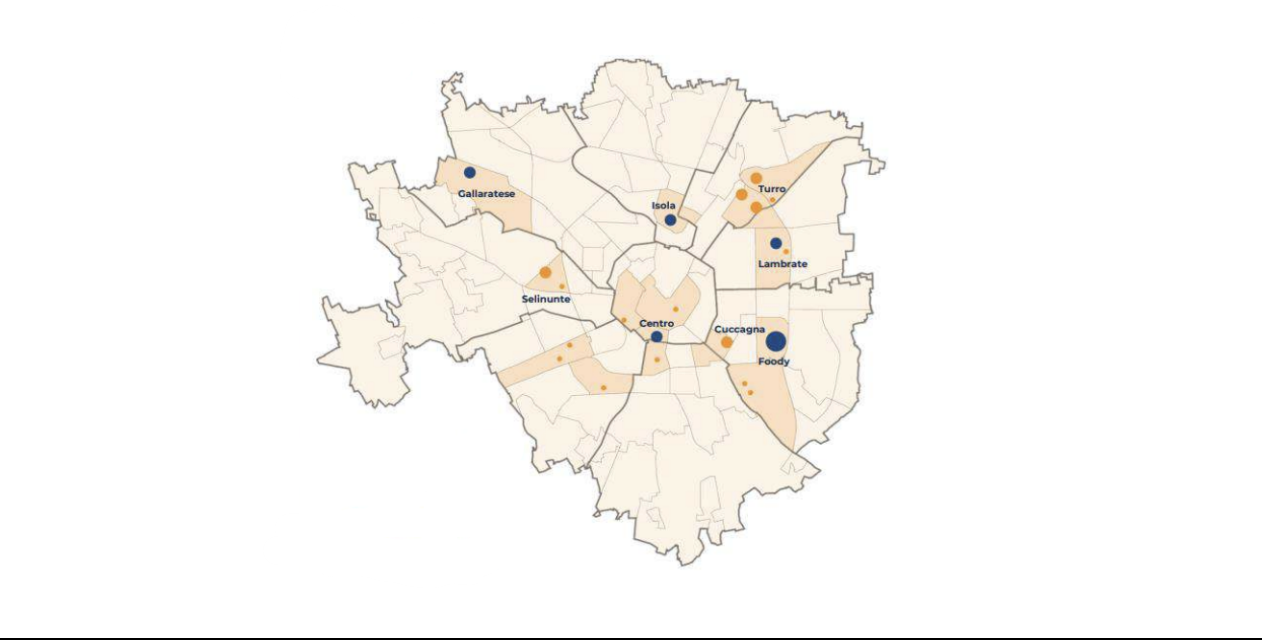Funded under the National Recovery and Resilience Plan (NRRP), Mission 4 Component 2 Investment 1.3, Theme 10.
Neighborhood Hubs: A New Redistribution Model to Combat Food Waste and Insecurity
Neighborhood Hubs are a recognized and effective tool in the fight against food waste and insecurity in urban areas: the case of Milan proves it.

Andrea Rizzuni
Researcher at Politecnico di Milano
The reduction of food waste and ensuring that all citizens have access to a sufficient amount of safe, healthy, and nutritious food are the two main objectives for achieving sustainable urban agri-food systems and addressing the so-called "food waste paradox"—the coexistence of large amounts of waste and food poverty.
In fact, while approximately one-third of all food produced in agri-food supply chains is wasted, more than 730 million people suffer from food insecurity each year. Although the majority of food insecurity is concentrated in low-income countries, major cities in more developed nations also exhibit alarming rates of poverty.
In this context, the Neighborhood Hubs Against Food Waste established by the Municipality of Milan serve as an example of a successful collaborative initiative capable of contributing to the sustainability of urban agri-food systems.
Neighborhood Hubs in Milan
Following the 2015 Universal Exposition (“Feeding the Planet, Energy for Life”), the Municipality of Milan adopted a citywide food policy, which outlined five priorities. Two of these priorities - Ensuring Healthy Food for All and Combating Food Waste - directly address the food waste paradox and were subsequently integrated into the Neighborhood Hubs project.
The project was developed under a memorandum of understanding between the Municipality of Milan, Fondazione Cariplo, the Politecnico di Milano, and Assolombarda, culminating in the opening of the first Hub in the Isola neighborhood in January 2019.
Neighborhood Hubs operate based on a well-defined management model. Logistically, the Hubs are small warehouses managed by third-sector organizations. These organizations collect unsold products from businesses within the neighborhood (mainly large retail chains) and redistribute them to non-profit organizations that provide direct assistance to those in need.
Thanks to their localized scale and rapid operations (surpluses are typically redistributed on the same day or the next), the Neighborhood Hubs are economically efficient, ensuring thorough recovery and redistribution of surplus goods, including fresh products such as fruits, vegetables, meat, fish, dairy, eggs, and baked goods—items generally less common in traditional food packages.
From a managerial and organizational perspective, the Hubs are structured and governed by a network that integrates the expertise and resources of various private, public, and third-sector actors, all under the direction and supervision of the Municipality of Milan and with monitoring of flows and performance by the Politecnico di Milano.
For example, food, financial, and operational resources are provided by a range of public and private sponsors and donors, while the recovery and redistribution operations are largely carried out by third-sector organizations.
The model wins on a local dimension. You can access fresh products and you can coordinate with recipients who come to collect food two or three times per month and give them those precious nutrients because you collect daily. And you have the possibility to build meaningful social connections in the neighbourhood.
Expansion and Diversification of Neighborhood Hub Activities
Following the success of the initial pilot, the network has progressively expanded, involving new stakeholders and extending its geographic coverage across various districts of the city. This expansion has coincided with a diversification of activities carried out within the different Hubs.
For instance, at the Foody Hub (opened at the end of 2021), surplus fruits and vegetables are collected by several third-sector organizations that share a refrigerated warehouse within the Ortomercato. At the Gallaratese Hub (opened in July 2021) and the Centro Hub (opened in September 2022), the food surplus redistribution warehouse is complemented by a social supermarket, where beneficiaries can shop using a points-based card system.
Additionally, food assistance activities are integrated into a broader support system that provides comprehensive services. For example, the Gallaratese Hub operates in a previously unused municipal space and hosts activities by various third-sector organizations offering services such as legal support, psychological assistance, training, and job placement.

With the opening of three new Hubs during 2024, the network now comprises eight active Hubs across seven different city districts, involving over 50 partners from private, public, and third sectors. In 2023, the Neighborhood Hub network recovered and redistributed approximately 615 tons of food (equivalent to over one million meals), assisting a total of 27,000 beneficiaries.
A Tool to Reduce Food Waste and Insecurity
The significance of this project has been internationally recognized through its victory in the Earthshot Prize awarded by the Royal Foundation of the United Kingdom, in the category "Build a Waste-Free World." The prize, accompanied by a £1 million grant, has enabled efforts to strengthen and expand the network.
Although the fight against food waste, poverty, and food insecurity is far from over, the development of initiatives like the Neighborhood Hubs—built on innovative operational models, a strong collaborative framework, and robust integration into local public welfare systems—represents a step in the right direction.

Andrea Rizzuni
Researcher at Politecnico di Milano



